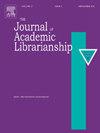设计有效的图书馆寻宝:理论、实践和框架对齐
IF 2.3
3区 管理学
Q2 INFORMATION SCIENCE & LIBRARY SCIENCE
引用次数: 0
摘要
长期以来,寻宝活动一直被用于学术图书馆教学,作为一种通过主动学习、探索和冒险来培养信息素养技能的互动方法。本文对图书馆寻宝的理论与实践进行了全面分析。它首先区分寻宝游戏和寻宝游戏,并强调准确术语的重要性。然后检查其有效性背后的教学原则,然后对相关文献进行回顾。本文还讨论了与设计和实现这些活动的劳动密集型过程相关的挑战。单独分析课程对齐、学习成果以及寻宝任务如何与ACRL《高等教育信息素养框架》相一致,并提供加强或调整这些活动以支持该框架的策略。本文介绍了两个案例研究:一个侧重于基于团队的、面对面的寻宝活动,另一个侧重于个人使用的异步、完全虚拟活动。适合于特定的图书馆环境,这些可用于通过主动学习建立和加强信息素养。本文章由计算机程序翻译,如有差异,请以英文原文为准。
Designing effective library treasure hunts: Theory, practice, and framework alignment
Treasure hunts have long been employed in academic library instruction as an interactive method for fostering information literacy skills through active learning, exploration, and adventure. This essay offers a comprehensive analysis of the theory and practice of library treasure hunts. It begins by distinguishing treasure hunts from scavenger hunts and emphasizing the importance of accurate terminology. The pedagogical principles underlying their effectiveness are then examined, followed by a review of the relevant literature. The essay also addresses the challenges associated with the labor-intensive process of designing and implementing these activities. A separate analysis course alignment, learning outcomes, and how the tasks in treasure hunts align with the ACRL Framework for Information Literacy in Higher Education, and offers strategies for enhancing or adapting these activities to support the Framework.
Two case studies are presented: one focusing on a team-based, in-person treasure hunt and the other one an asynchronous, fully virtual activity for individual use. Suitable customized to a particular library environment, these may be used to build and reinforce information literacy through active learning.
求助全文
通过发布文献求助,成功后即可免费获取论文全文。
去求助
来源期刊

Journal of Academic Librarianship
INFORMATION SCIENCE & LIBRARY SCIENCE-
CiteScore
5.30
自引率
15.40%
发文量
120
审稿时长
29 days
期刊介绍:
The Journal of Academic Librarianship, an international and refereed journal, publishes articles that focus on problems and issues germane to college and university libraries. JAL provides a forum for authors to present research findings and, where applicable, their practical applications and significance; analyze policies, practices, issues, and trends; speculate about the future of academic librarianship; present analytical bibliographic essays and philosophical treatises. JAL also brings to the attention of its readers information about hundreds of new and recently published books in library and information science, management, scholarly communication, and higher education. JAL, in addition, covers management and discipline-based software and information policy developments.
 求助内容:
求助内容: 应助结果提醒方式:
应助结果提醒方式:


